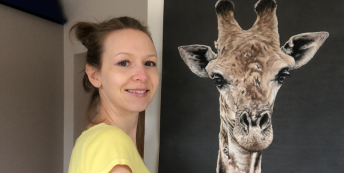“It felt like I was going through the motions, rather than actively enjoying my career.”

Newly Updated
What work were you doing previously?
I was working as an R&D scientist for Unilever.
My job was to test and design new deodorant formulations.
What are you doing now?
I'm now a freelance digital marketing consultant specialising in life sciences.
How did you feel in your work before you decided to make the change?
I felt like I was stuck in a dead-end job.
There was a lack of opportunities. And it felt like politics mattered than the actual work that was completed.
I had no real desire to continue as a scientist, yet I had no real reason to leave. It almost felt like I was going through the motions rather than actively enjoying my career.
Why did you change?
My decision to change was a bit of a gamble.
I had an interest in digital marketing and I could see the industry continue to grow. I started learning about digital marketing by accident, as I was learning digital marketing to grow one of my personal websites. I didn't consider it a career change until I realised how in demand the skill set was.
When was the moment you decided to make the change?
There was no one defining moment that made me want to change, but I was starting to actively dislike the thought of work.
I also had some new colleagues who were not nice people. I realised I wanted to hand in my notice.
How did you choose your new career?
I chose my new career by accidentally learning about digital marketing as just a hobby for my own website.
When I first started, I never even thought about making a career change into it in the future.
Are you happy with the change?
Yes, definitely.
I've had a chance to learn about a new industry and see a different side to business.
I also now have two distinct sets of skills that not many people have, let alone with industry experience.
What do you miss and what don't you miss?
I mostly miss my colleagues (the ones whom I enjoyed working with), and I also miss the chance of doing experiments in the lab.
I don't miss the micro-management, and politics of working in a large company.
How did you go about making the shift?
I made the shift gradually, without making too much of a conscious effort to do so.
I spent a lot of my evenings and weekends reading and learning how to do things, but most importantly I practised my new skills on my own personal project.
What didn't go well? What wrong turns did you take?
There wasn't really anything I look back on that I think didn't go well.
However, I wasn't expecting there to be such a change in working style between my old and new role.
In hindsight, it would have been useful to have found people that had made a similar career change to me and spoken to them prior and during my career change.
How did you handle your finances to make your shift possible?
I had savings that were able to tide me over.
I also had income from the side project I was working on, which, coincidentally, helped me learn the skills to get my new career.
What was the most difficult thing about changing?
The most difficult thing has been that feeling of 'starting again'.
It can be easy to think that you have wasted your time in a previous career, but that quickly subsides. You can always go back if it doesn't work.
What help did you get? 
The help I got was from colleagues and friends, whom I confided in before making the move.
I made sure to mention my plans to as many people I could (in confidence) to get their opinions and viewpoints before committing. Most people were very supportive and this helped give me the confidence to do it!
What resources would you recommend to others?
I would recommend looking to find out as much as possible about the new industry you are going into, particularly about what makes up a 'typical' day.
If possible, try to read case studies from as many people as possible – positive and negative!
What have you learnt in the process?
I've learnt that flexibility and willingness to adapt help make the transition as easy as possible.
You cannot move career and just expect everything to work as you would like.
What would you advise others to do in the same situation?
Take your time to fully understand the change that you're thinking about.
Make sure to speak to friends and colleagues to get their opinion also. If you have a manager that you can trust, then mention it to them too and gauge their opinion.
You have to realise that it can be a bit of a risk, but make sure you are informed enough to make it an educated gamble. If it doesn't work out as you expect, you can always go back to your old sector!
We caught up with Patrick recently to see how his shift was working out, roughly two years on. Here's what he's been up to, and the biggest lessons he's learned.

What's changed for you in your career since we first published your story?
Very little has changed in my career in regards to the job I’m doing, but I consider myself successful in the period since I started, and I’m definitely happy that I made the change.
I earn more money than I ever had in employed jobs, have more free time, and the flexibility to try new side projects whenever I can.
How do you feel about your work now?
I feel good.
There are plenty of opportunities, I can charge a decent wage, and enjoy all the benefits of setting my own schedule.
However, it still takes a lot of planning and effort to carefully balance how much work I take on to ensure I earn enough, without putting on too much stress.
What challenges have you come up against since making your shift, and how exactly have you dealt with them?
One of the biggest challenges is that friends and family members often think that because I work for myself and set my own hours, this immediately makes me available for anything during work hours.
My default is to now reject anything during standard work hours, regardless of my schedule.
Similarly to this, having to say no or cancel plans because there’s work that needs to be done outside of normal work hours is also difficult to do. This tends to be forgiven, as long as you don't make it a regular occurrence!
How is the financial side of things panning out, and is this what you'd expected?
I've never had a financial plan in the sense I wanted to make a certain amount of money a year by a certain date.
However, I’ve been lucky that there have been plenty of work opportunities, which has allowed me to save money, preventing any worries for periods where work opportunities are limited.
One challenging aspect with finances were taxes. Whilst I consider myself good with numbers, I was unprepared for how little I knew about tax laws, which made sorting my finances out very stressful. Once I found myself a good accountant, I relieved myself of a massive burden I didn't realise I had!
What have you learned, since making your shift?
I've learnt that it’s very difficult to accurately predict what the future holds for you when working for yourself.
Sometimes it goes ahead of schedule, then other times it’ll be more difficult.
I've also found that networking is incredibly important for your reputation and for bringing in work. Networking should be treated as a long term investment for it to pay out any dividends for success!
To find out more about Patrick's services, visit www.patrickwareing.com.
What lessons could you take from Patrick's story to use in your own career change? Let us know in the comments below.



